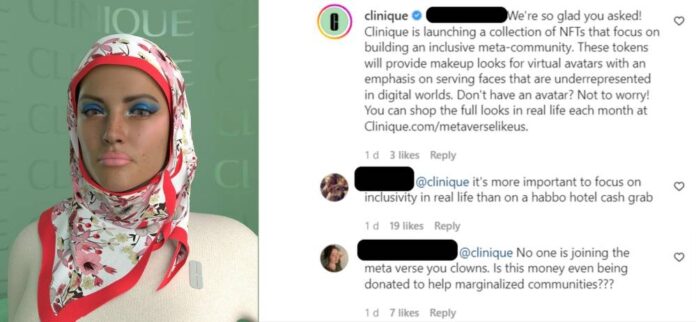Cliniquenft1 – Clinique responds to a user who was unclear as to how the NFTs related to real life products, along with the backlash received by the brand. — Screenshot via Instagram/ clinique
Follow us on Instagram, subscribe to our Telegram channel and browser alerts for the latest news you need to know.
PETALING JAYA, June 10 — Beauty brand Clinique’s latest NFT, aimed at promoting diversity in the metaverse, has left some makeup fans bewildered.
On Wednesday, the brand announced its “Metaverse More Like Us” makeup NFT campaign, which “challenges unrealistic beauty standards and champions individuality”.
NFTs, or non-fungible tokens, are tokens which verify ownership of a specific digital asset such as images and videos — like the name implies, these tokens do not exist physically.
The metaverse broadly refers to an interactive virtual world, which parallels the physical world.
On the brand’s Instagram, some users appeared excited by the campaign — many however, pointed out that Clinique could do more good by focusing on real-life inclusivity.
“So instead of advocating for real women in the real world, you contribute to the scam of NFTs for an online world that barely anyone is using right now?” said one user.
“Why not actually just support marginalised communities by hiring people as models instead of creating a digital one to sell?” said another.
Some fans of the brand were disappointed that the announcement was not for a better website or brand app; as one user wrote, “Maybe fix your website before focusing on this stupidity.”
Others were apparently “creeped out” by the highly realistic 3D models showcased in the campaign.
Clinique’s campaign sees three makeup influencers — celebrity makeup artist Sheika Daley, transgender TikTok star Emira D’spain, and disabled makeup artist Tess Daly — creating looks for non-fungible people (NFPs) or avatars.
These looks will be rolled out to 1,968 randomly selected avatars on software company Daz 3D’s virtual world every month from July onwards.
“In the Metaverse, as it stands today, only 20 per cent of users and creators are women, less than 16 per cent of all NFT artists are female, and NFTs with avatars of colour and disability are valued lower than white avatars,” said the brand in a press release.
“In addition, the ‘Metaverse More Like Us’ campaign directly addresses the lack of diverse avatars and the marginalization that currently exists in the digital world.”


